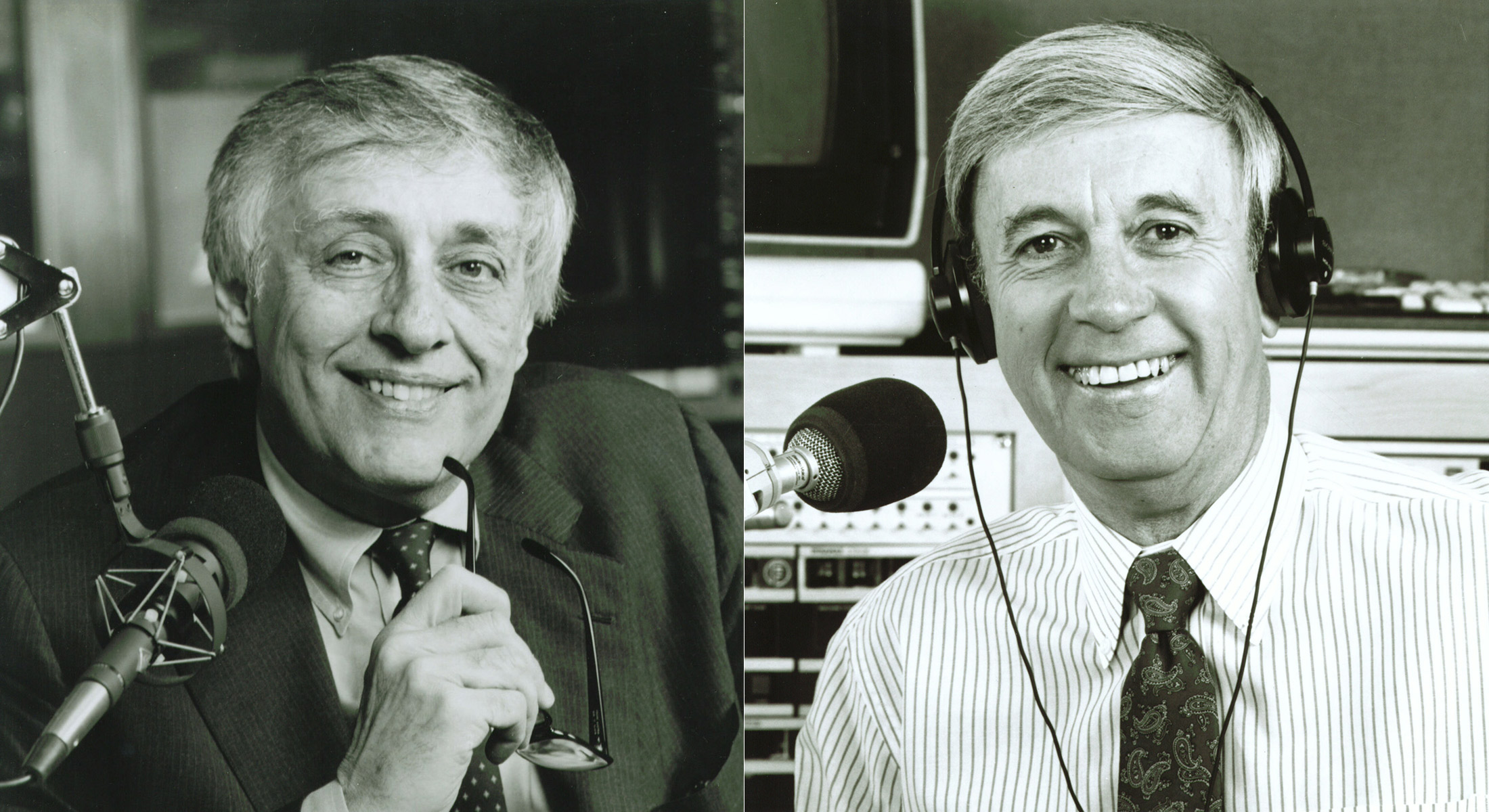70 years of WGN Radio audio to be archived at Northwestern Libraries
EVANSTON, Ill. — For 100 years, WGN Radio has been a source of all-talk programming that has connected Chicagoland — and well beyond, thanks to the impressive broadcast range of the 50,000-watt station at 720 AM. Its lineup of memorable hosts, long-running cultural programming and avid local sports coverage has enshrined WGN Radio as a cherished companion for generations of listeners in cars and kitchens.
Thanks to a gift from Nexstar Media Group, Inc., parent company of WGN Radio, a 70-year swath of the radio station’s audio archive now resides at Northwestern University Libraries in the Charles Deering McCormick Library of Special Collections and University Archives.
The archive, with materials covering 1941 to 2011, includes more than 15,000 items, primarily magnetic media (open reel tapes, compact cassettes, continuous-loop “carts,” U-matic videocassettes and VHS tapes) as well as other media such as grooved discs, CDs and minidiscs. The bulk of the audio dates to the 1980s and 1990s, a period of innovation and surging popularity for the station.
The archive contains thousands of hours of audio that will need to be cataloged and, where necessary, digitally preserved before they can be made publicly available, said Scott Krafft, curator of Special Collections at Northwestern.
“It’s a remarkable collection that represents a significant sampling of Chicago history, including local and national news,” he said. “In addition, the voices of WGN Radio’s most popular programs are represented here, making this an important archive for the history of the entire field of radio broadcasting.”
“Given the long and storied connection between WGN Radio and Northwestern University, it is most fitting that this audio collection, drawn out of 70 years of our broadcast history, will be under their care,” said Mary Sandberg Boyle, vice president and general manager of WGN Radio. “While digitizing it will be a substantial undertaking for the Northwestern Libraries, ultimately, this will be a permanent and invaluable repository and resource for years to come. We trust their expertise and are proud they are the caretakers in this endeavor.”
Preserving an audio archive, to say nothing of just listening to it, poses a particular challenge to a cultural heritage institution, Krafft said. For example, magnetic media like audio tape is notoriously unstable. Tapes relay information by storing patterns of magnetic particles on an acetate or polyester base; over time such materials can break down on their own, even in the ideal climate-controlled storage libraries can provide.
In addition, the archive contains other fragile media like glass “transcription discs,” a radio recording solution common during World War II. The lacquer coating on such discs can separate from the glass over time, a process called “delamination,” after which the recording is lost. Couple these issues with the obsolescence and precarity of aging playback equipment, and even listening to analog audio can be a challenge.
“Navigating the preservation of this archive will take time,” Krafft said. “But in the end, it will be worth it to preserve the cultural record represented by WGN Radio.”
Founded in 1922 as WDAP, the station was purchased in 1924 by Chicago Tribune publisher Col. Robert McCormick, who changed its call letters to WGN, an acronym of the Tribune’s slogan, “World’s Greatest Newspaper.” WGN Radio continues to broadcast talk shows, news, sports coverage and traffic updates through its transmitting tower in Elk Grove Village — one of the tallest structures in the Chicago area. It is currently the radio home of Chicago Blackhawks hockey games and Northwestern University football and men’s basketball.
The litany of hosts represented in the archive include well-remembered Chicago mainstays such as Wally Phillips, a quick-witted mischief-maker who bantered with callers during a top-ranked morning show that ran from 1965 to 1986; the folksy, funny Bob “Uncle Bobby” Collins, who succeeded Phillips in the morning slot and extended WGN Radio’s reign as Chicago’s top-rated morning station until Collins’ death in 2000; Roy Leonard, who interviewed nationally revered musicians, actors and writers for 30 years in a popular midday show; Milt Rosenberg, the 40-year host of the long-form interview program “Extension 720” that brought in notable newsmakers from Jimmy Carter to Carl Sagan; and Kathy O’Malley and Judy Markey, whose riotous midday talk show debuted in 1989, providing a then-rare showcase for women’s voices in radio.
The collection also includes Northwestern games called by alumnus Dave Eanet ’77, who has been WGN’s voice of Wildcats football and basketball games since the 1990s.
“When WGN first approached us 10 years ago about taking on this collection, I knew the longitudinal coverage of such an archive would be just astounding,” said Sarah Pritchard, dean of Northwestern Libraries. “Our role as a library at a research institution is to collect and preserve culturally important materials like this. The WGN Radio archive will provide a laboratory for future researchers looking at 20th century media as it intersected with Chicago’s cultural and political history.”
The arrival of this rich journalism archive is a natural fit at Northwestern because of the University’s own entwined history with the one of the founders of the Tribune, said Charles Whitaker ’80, ’81 MS, dean of the Medill School of Journalism, Media, Integrated Marketing Communications.
“In 1921, family members connected with the Chicago Tribune provided funding to establish the journalism school at Northwestern, which was named in honor of their grandfather, Joseph Medill. We have proudly built on that gift for more than a century to make Medill the best school of its kind in the world,” Whitaker said. “This new gift of the WGN Radio archives enhances this longstanding relationship and allows scholars studying journalism or other topics to access critical interviews and reports. It’s often said journalists record the first draft of history, and this archive is an important capture of that draft.”
About Nexstar Media Group, Inc.
Nexstar Media Group, Inc. (NASDAQ: NXST) is a leading diversified media company that produces and distributes engaging local and national news, sports and entertainment content, including 290,000 hours of original video content each year. Nexstar owns America’s largest local broadcasting group comprised of top network affiliates, with 200 owned or partner stations in 116 U.S. markets reaching 212 million people. Nexstar’s television assets also include NewsNation, America’s fastest-growing national news and entertainment cable network reaching 75 million television homes, popular entertainment multicast networks Antenna TV and Rewind TV, and a 31.3% ownership stake in TV Food Network. The Company’s portfolio of digital assets, including The Hill and BestReviews, are collectively a top 10 U.S. digital news and information property. In addition to delivering exceptional content and service to our communities, Nexstar provides premium multiplatform advertising opportunities at scale for businesses and brands seeking to leverage the strong consumer engagement of our compelling content offering. For more information, please visit www.nexstar.tv.
 Photo: Longtime WGN Radio hosts, Milt Rosenberg (left) and Wally Phillips (right). Their voices are some of those archived in the vast collection of WGN Radio recordings (1941-2011) recently gifted to Northwestern Libraries by Nexstar Media Group, Inc., WGN Radio’s parent company. Courtesy of WGN Radio.
Photo: Longtime WGN Radio hosts, Milt Rosenberg (left) and Wally Phillips (right). Their voices are some of those archived in the vast collection of WGN Radio recordings (1941-2011) recently gifted to Northwestern Libraries by Nexstar Media Group, Inc., WGN Radio’s parent company. Courtesy of WGN Radio.
Sara Tieman | Promotions & PR Manager
WGN Radio | 303 E. Wacker Drive, 18th Floor | Chicago, Illinois 60601
Tel: 312-222-5098 | stieman@wgnradio.com
BYLINE: Drew Scott
MEDIA CONTACT: Max Witynski | 847-467-6105 | max.witynski@northwestern.edu
